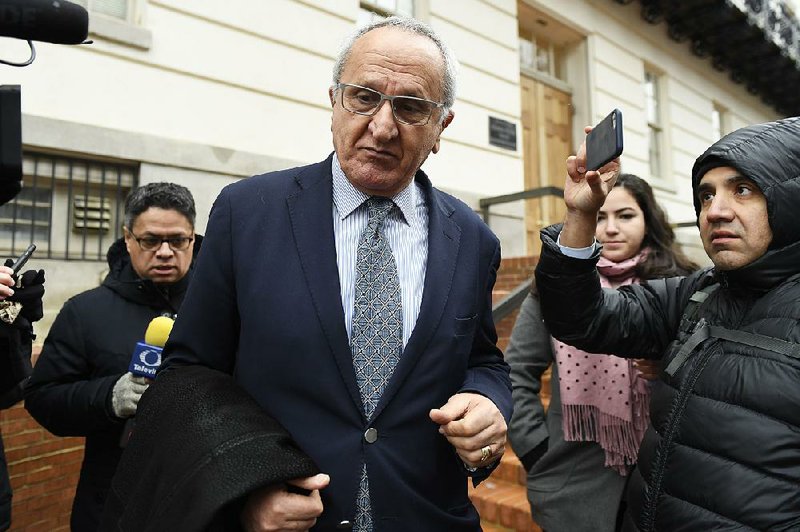WASHINGTON -- The United States and Mexico moved quickly Monday to defuse a dispute over the revamped North American trade pact.
At issue are five labor attaches whom the U.S. intends to send to Mexico to oversee the Mexican government's labor measures. Those plans were revealed Friday when the U.S. published the implementing legislation for the U.S.-Mexico-Canada Agreement -- the legal text of the pact that the U.S. Congress will vote on.
Over the weekend, Mexico's top trade negotiator, Jesus Seade, complained that Mexico had been blindsided by the provision on the attaches.
All along, Mexican negotiators have rejected the idea that American officials could roam the country, inspecting factories to make sure Mexico was living up to commitments to let workers organize unions and bargain for higher wages and better working conditions.
Seade took to Twitter to declare: "Mexico will NEVER accept them if it is in any way about disguised inspectors, for one simple reason: Mexican law prohibits it."
It was unclear what Mexico could actually do about the attaches, as its Senate has already ratified the trade agreement. Seade said the U.S. attaches were not mentioned in the pact that Mexico agreed to.
On Monday, U.S. Trade Representative Robert Lighthizer wrote a letter reassuring Seade that "these personnel will not be 'labor inspectors' and will abide by all relevant Mexican laws."
[Gallery not loading above? Click here for more photos » arkansasonline.com/1217trade/]
"My suspicion is that these attaches will take a big-picture view and focus on egregious situations and point those out and give notice to the Mexican government," said Miguel Noyola, a partner at Baker & McKenzie LLP, who specializes in business in Mexico and Latin America. "I don't think they will just be going on fishing expeditions."
Seade, after meeting with Lighthizer in Washington on Monday, told reporters: "I am satisfied. And I called the authorities in Mexico, and they are satisfied."
Earlier, Mexican Foreign Minister Marcelo Ebrard minimized the dispute, saying that the pact remained intact" and that Mexico did not feel tricked by the provision on the attaches.
The pact is replacing the 25-year-old North American Free Trade Agreement, which tore down most trade barriers among the United States, Canada and Mexico. NAFTA triggered a surge in trade among the three countries. But Trump and other critics said it cost the United States jobs by encouraging factories to move south of the border to take advantage of low-wage Mexican laborers, who were largely prevented from forming independent unions.
Trump demanded a rewrite and pushed for Mexico and Canada to sign the new agreement. But the revamped regional trade deal also needs to be approved by the U.S. Congress, and Democrats in the House demanded -- and got -- beefed-up language meant to ensure that Mexico goes through with promised labor measures, including those designed to encourage independent unions.
Strong terms for enforcing the pact's labor-rights chapter was essential to win Democratic support. House Speaker Nancy Pelosi, D-Calif., took credit last week for securing changes from the original deal, which Trump and the leaders of Mexico and Canada signed last year.
Daniel Ujczo, chairman of the international practice at Dickinson Wright PLLC in Columbus, Ohio, said there was "some theater in all of this as a result of the Democrats taking victory laps last week. It is making it difficult for Mexico to save face in light of some significant, yet necessary, concessions to get the deal done." It was, he said, "necessary for Mexico to show some pushback."
Seade said over the weekend that Mexico would refuse to allow the U.S. to dispatch diplomats to Mexican factories -- a demand his government already had rejected during the recent bargaining over ways to tweak the trade deal to win support from Democrats in the U.S. House.
But with the Mexican Senate already having ratified the three-country accord, Seade had little leverage to demand a change. Several trade analysts, speaking on background so as not to offend the Mexican official, described the dispute as reflecting domestic politics in both countries.
The attaches' broad mandate to assist Mexican officials and workers on implementation of Mexico's sweeping labor measures may have inflamed Mexican business sensitivities about American influence, which Seade felt obliged to counter.
"It looks to me like Seade might have some buyer's regret and didn't quite understand how much rope he was giving Lighthizer," said one former U.S. official, who asked for anonymity to preserve his relationship with the Mexican official.
Lighthizer pointed out in his letter to Seade that the U.S. Embassy in Mexico City already includes attaches from more than a dozen federal agencies, including the departments of Agriculture, Commerce, Defense, Treasury and Justice. Mexico, likewise, stations attaches in the United States.
House Democrats do not plan to make any changes to the implementing legislation, which is scheduled for a House Ways and Means Committee vote today and a vote by the full House on Thursday, according to a senior House Democratic official.
"It's pretty much locked in," the official said.
If approved in the House, the legislation would then move to the Senate.
Information for this article was contributed by Luis Alonso Lugo and Paul Wiseman of The Associated Press and by David J. Lynch, Seung Min Kim and Erica Werner of The Washington Post.
A Section on 12/17/2019
